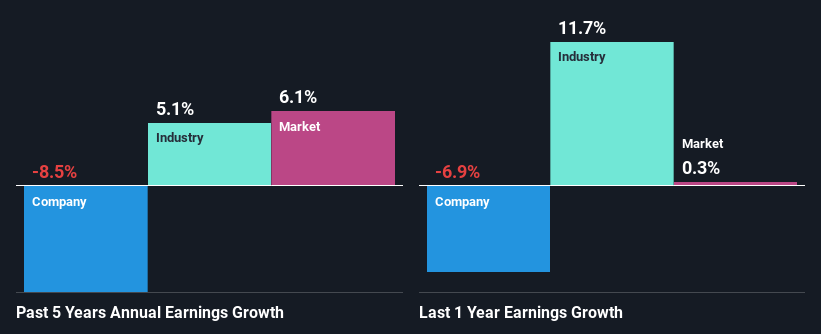Do Its Financials Have Any Role To Play In Driving Karrie International Holdings Limited's (HKG:1050) Stock Up Recently?
Karrie International Holdings' (HKG:1050) stock is up by a considerable 26% over the past month. We wonder if and what role the company's financials play in that price change as a company's long-term fundamentals usually dictate market outcomes. Particularly, we will be paying attention to Karrie International Holdings' ROE today.
ROE or return on equity is a useful tool to assess how effectively a company can generate returns on the investment it received from its shareholders. Put another way, it reveals the company's success at turning shareholder investments into profits.
Check out our latest analysis for Karrie International Holdings
How Is ROE Calculated?
The formula for ROE is:
Return on Equity = Net Profit (from continuing operations) ÷ Shareholders' Equity
So, based on the above formula, the ROE for Karrie International Holdings is:
17% = HK$170m ÷ HK$993m (Based on the trailing twelve months to March 2024).
The 'return' is the yearly profit. That means that for every HK$1 worth of shareholders' equity, the company generated HK$0.17 in profit.
Why Is ROE Important For Earnings Growth?
So far, we've learned that ROE is a measure of a company's profitability. Based on how much of its profits the company chooses to reinvest or "retain", we are then able to evaluate a company's future ability to generate profits. Assuming everything else remains unchanged, the higher the ROE and profit retention, the higher the growth rate of a company compared to companies that don't necessarily bear these characteristics.
Karrie International Holdings' Earnings Growth And 17% ROE
To start with, Karrie International Holdings' ROE looks acceptable. Further, the company's ROE compares quite favorably to the industry average of 7.6%. As you might expect, the 8.5% net income decline reported by Karrie International Holdings is a bit of a surprise. We reckon that there could be some other factors at play here that are preventing the company's growth. Such as, the company pays out a huge portion of its earnings as dividends, or is faced with competitive pressures.
However, when we compared Karrie International Holdings' growth with the industry we found that while the company's earnings have been shrinking, the industry has seen an earnings growth of 5.1% in the same period. This is quite worrisome.

Earnings growth is a huge factor in stock valuation. What investors need to determine next is if the expected earnings growth, or the lack of it, is already built into the share price. This then helps them determine if the stock is placed for a bright or bleak future. If you're wondering about Karrie International Holdings''s valuation, check out this gauge of its price-to-earnings ratio, as compared to its industry.
Is Karrie International Holdings Making Efficient Use Of Its Profits?
Karrie International Holdings has a high three-year median payout ratio of 51% (that is, it is retaining 49% of its profits). This suggests that the company is paying most of its profits as dividends to its shareholders. This goes some way in explaining why its earnings have been shrinking. The business is only left with a small pool of capital to reinvest - A vicious cycle that doesn't benefit the company in the long-run. You can see the 2 risks we have identified for Karrie International Holdings by visiting our risks dashboard for free on our platform here.
Additionally, Karrie International Holdings has paid dividends over a period of at least ten years, which means that the company's management is determined to pay dividends even if it means little to no earnings growth.
Summary
On the whole, we do feel that Karrie International Holdings has some positive attributes. However, while the company does have a high ROE, its earnings growth number is quite disappointing. This can be blamed on the fact that it reinvests only a small portion of its profits and pays out the rest as dividends. Up till now, we've only made a short study of the company's growth data. So it may be worth checking this free detailed graph of Karrie International Holdings' past earnings, as well as revenue and cash flows to get a deeper insight into the company's performance.
Have feedback on this article? Concerned about the content? Get in touch with us directly. Alternatively, email editorial-team (at) simplywallst.com.
This article by Simply Wall St is general in nature. We provide commentary based on historical data and analyst forecasts only using an unbiased methodology and our articles are not intended to be financial advice. It does not constitute a recommendation to buy or sell any stock, and does not take account of your objectives, or your financial situation. We aim to bring you long-term focused analysis driven by fundamental data. Note that our analysis may not factor in the latest price-sensitive company announcements or qualitative material. Simply Wall St has no position in any stocks mentioned.
 Index Options
Index Options CME Group
CME Group Nasdaq
Nasdaq Cboe
Cboe TradingView
TradingView Wall Street Journal
Wall Street Journal